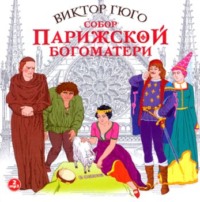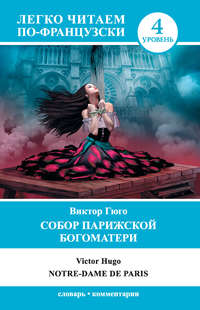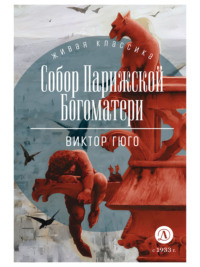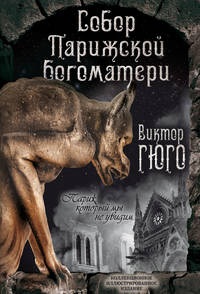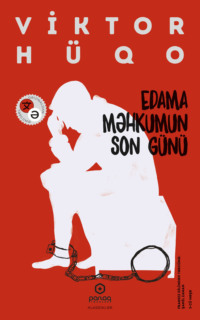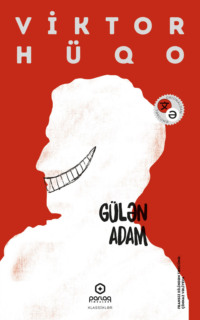 полная версия
полная версияLes Misérables, v. 4
CHAPTER II
GAVROCHE REAPS ADVANTAGE FROM NAPOLEON THE GREAT
Spring in Paris is very frequently traversed by sharp, violent breezes which, if they do not freeze, chill. These breezes, which sadden the brightest days, produce exactly the same effect as the blasts of cold wind which enter a warm room through the crevices of a badly closed door or window. It seems as if the gloomy gate of winter has been left ajar, and that the wind comes from there. In the spring of 1832, the period when the first great epidemic of this century broke out in Europe, these breezes were sharper and more cutting than ever, and some door even more icy than that of winter had been left ajar. It was the door of the sepulchre, and the breath of cholera could be felt in these breezes. From a meteorological point of view these cold winds had the peculiarity that they did not exclude a powerful electric tension. Frequent storms, accompanied by thunder and lightning, broke out at this period.
One evening, when these breezes were blowing sharply, so sharply that January seemed to have returned, and the citizens had put on their cloaks again, little Gavroche, still shivering gayly under his rags, was standing as if in ecstasy in front of a hair-dresser's shop in the vicinity of the Orme-Saint Gervais. He was adorned with a woman's woollen shawl, picked up no one knew where, of which he had made a muffler. Little Gavroche appeared to be lost in admiration of a waxen image of a bride, wearing a very low-necked dress, and a wreath of orange-flowers in her hair, which revolved between two lamps, and lavished its smiles on the passers-by; but in reality he was watching the shop to see whether he could not "prig" a cake of soap, which he would afterwards sell for a sou to a barber in the suburbs. He frequently breakfasted on one of these cakes, and he called this style of work, for which he had a talent, "shaving the barbers." While regarding the bride, and casting sheep's eyes on the cake of soap, he growled between his teeth: "Tuesday: this is not Tuesday. Is it Tuesday? Perhaps it is Tuesday; yes, it is Tuesday." What this soliloquy referred to was never known; but if it was to the last time he had dined, it was three days ago, for the present day was a Friday. The barber, in his shop warmed with a good stove, was shaving a customer and taking every now and then a side-glance at this enemy, – this shivering and impudent gamin who had his two hands in his pockets, but his mind evidently elsewhere.
While Gavroche was examining the bride, the window, and the Windsor soap, two boys of unequal height, very decently dressed, and younger than himself, one apparently seven, the other five years of age, timidly turned the handle and entered the shop, asking for something, charity possibly, in a plaintive murmur which was more like a sob than a prayer. They both spoke together, and their words were unintelligible, because sobs choked the voice of the younger boy, and cold made the teeth of the elder rattle. The barber turned with a furious face, and without laying down his razor drove the older boy into the street with his left hand, and the little one with his knee, and closed the door again, saying, —
"To come and chill people for nothing!"
The two lads set out again, crying. A cloud had come up in the mean while, and it began raining, little Gavroche ran up to them, and accosted them thus, —
"What's the matter with you, brats?"
"We don't know where to sleep," the elder replied.
"Is that all?" said Gavroche; "that's a great thing. Is that anything to cry about, simpletons?" And assuming an accent of tender affection and gentle protection, which was visible through his somewhat pompous superiority, he said, —
"Come with me, kids."
"Yes, sir," said the elder boy.
And the two children followed him as they would have done an archbishop, and left off crying. Gavroche led them along the Rue St. Antoine, in the direction of the Bastille, and while going off took an indignant and retrospective glance at the barber's shop.
"That whiting has no heart," he growled; "he's an Englishman."
A girl, seeing the three walking in file, Gavroche at the head, burst into a loud laugh. This laugh was disrespectful to the party.
"Good day, Mamselle Omnibus," Gavroche said to her.
A moment after the hair-dresser returning to his mind, he added, —
"I made a mistake about the brute; he is not a whiting, but a snake. Barber, I'll go and fetch a locksmith, and order him to put a bell on your tail."
This barber had made him aggressive; as he stepped across a gutter, he addressed a bearded portress, worthy to meet Faust on the Brocken, and who was holding her broom in her hand, —
"Madame," he said to her, "I see that you go out with your horse."
And after this he plashed the varnished boots of a passer-by.
"Scoundrel!" the gentleman said furiously. Gavroche raised his nose out of the shawl.
"Have you a complaint to make, sir?"
"Yes, of you," said the gentleman.
"The office is closed," Gavroche remarked. "I don't receive any more complaints to-day."
As he went along the street he noticed a girl of thirteen or fourteen, shivering in a gateway, in such short petticoats that she showed her knees. But the little girl was beginning to get too tall a girl for that. Growth plays you such tricks, and the petticoat begins to become short when nudity grows indecent.
"Poor girl," said Gavroche, "she hasn't even a pair of breeches. Here, collar this."
And taking off all the good wool which he had round his neck he threw it over the thin violet shoulders of the beggar-girl, when the muffler became once again a shawl. The little girl looked at him with an astonished air, and received the shawl in silence. At a certain stage of distress a poor man in his stupor no longer groans at evil, and gives no thanks for kindness. This done, —
"B-r-r!" said Gavroche, colder than Saint Martin, who, at any rate, retained one half his cloak. On hearing this "Brr," the shower, redoubling its passion, poured down; those wicked skies punish good actions.
"Hilloh!" Gavroche shouted, "what's the meaning of this? It is raining again. Bon Dieu! if this goes on, I shall withdraw my subscription."
And he set out again.
"No matter," he said as he took a glance at the beggar-girl crouching under her shawl, "she's got a first-rate skin."
And, looking at the clouds, he cried, – "Sold you are!"
The two children limped after him, and as they passed one of those thick close gratings which indicate a baker's, for bread, like gold, is placed behind a grating, Gavroche turned round.
"By the bye, brats, have you dined?"
"We have had nothing to eat, sir, since early this morning," the elder answered.
"Then you haven't either father or mother?" Gavroche continued magisterially.
"I beg your pardon, sir; we have a pa and a ma, but we don't know where they are."
"Sometimes that is better than knowing," said Gavroche, who was a philosopher in his small way.
"We have been walking about for two hours," the lad continued, "and looked for things at the corners of the streets, but found nothing."
"I know," said Gavroche; "the dogs eat everything."
He resumed after a pause, —
"And so we have lost our authors. We don't know what we have done with them. That isn't right, gamins. It is foolish to mislay grown-up people. Well, one must swig, for all that."
He did not ask them any more questions, for what could be more simple than to have no domicile? The elder of the boys, who had almost entirely recovered the happy carelessness of childhood, made this remark: "It is funny all the same. Mamma said she would take us to look for blessed box, on Palm Sunday. Mamma is a lady who lives with Mamselle Miss."
"Tanflute!" added Gavroche.
He stopped, and for some minutes searched all sorts of corners which he had in his rags: at length he raised his head with an air which only wished to represent satisfaction, but which was in reality triumphant, —
"Calm yourselves, kids; here is supper for three."
And he drew a sou from one of his pockets; without giving the lads time to feel amazed, he pushed them both before him into the baker's shop, and laid his sou on the counter, exclaiming, —
"Garçon, five centimes' worth of bread."
The baker, who was the master in person, took up a loaf and a knife.
"In three pieces, garçon," remarked Gavroche, and he added with dignity, —
"We are three."
And seeing that the baker, after examining the three suppers, had taken a loaf of black bread, he thrust his finger into his nose, with as imperious a sniff as if he had the great Frederick's pinch of snuff on his thumb, and cast in the baker's face this indignant remark, —
"Keksekça?"
Those of our readers who might be tempted to see in this remark of Gavroche's to the baker a Russian or Polish word, or one of the savage cries which the Ioways or the Botocudos hurl at each other across the deserted streams, are warned that this is a word which they (our readers) employ daily, and which signifies, qu'est ce que c'est que cela? The baker perfectly comprehended, and replied, —
"Why, it is bread, very good seconds bread."
"You mean black bread," Gavroche remarked, with a calm and cold disdain. "White bread, my lad; I stand treat."
The baker could not refrain from smiling, and while cutting some white bread gazed at them in a compassionate way which offended Gavroche.
"Well, baker's man," he said, "what is there about us that you measure us in that way?"
When the bread was cut, the baker put the sou in the till, and Gavroche said to the two boys, —
"Grub away."
The boys looked at him in surprise, and Gavroche burst into a laugh.
"Oh, yes, that's true, they don't understand yet, they are so little."
And he continued, "Eat."
At the same time he gave each of them a lump of bread. Thinking that the elder, who appeared to him more worthy of his conversation, merited some special encouragement, and ought to have any hesitation about satisfying his hunger removed, he added, as he gave him the larger lump, —
"Shove that into your gun."
There was one piece smaller than the two others, and he took that for himself. The poor boys, Gavroche included, were starving; while tearing the bread with their teeth, they blocked up the baker's shop, who, now that he was paid, looked at them angrily.
"Let us return to the street," said Gavroche.
They started again in the direction of the Bastille; and from time to time as they passed lighted shops, the younger boy stopped to see what o'clock it was by a leaden watch hung round his neck by a string.
"Well, he is a great fool," said Gavroche.
Then he thoughtfully growled between his teeth, "No matter, if I had kids of my own I would take more care of them than that."
As they were finishing their bread, they reached the corner of that gloomy Rue de Ballet at the end of which the low and hostile wicket of La Force is visible.
"Hilloh, is that you, Gavroche?" some one said.
"Hilloh, is that you, Montparnasse?" said Gavroche.
It was a man who accosted Gavroche, no other than Montparnasse disguised with blue spectacles, but Gavroche was able to recognize him.
"My eye!" Gavroche went on, "you have a skin of the color of a linseed poultice and blue spectacles like a doctor. That's your style, on the word of an old man!"
"Silence," said Montparnasse, "not so loud;" and he quickly dragged Gavroche out of the light of the shops. The two little boys followed mechanically, holding each other by the hand. When they were under the black arch of a gateway, protected from eyes and rain, Montparnasse remarked,
"Do you know where I am going?"
"To the abbey of Go-up-with-regret" (the scaffold), said Gavroche.
"Joker!"
And Montparnasse added, —
"I am going to meet Babet."
"Ah!" said Gavroche, "her name is Babet, is it?"
Montparnasse lowered his voice, —
"It is not a she, but a he."
"I thought he was buckled up."
"He has unfastened the buckle," Montparnasse replied.
And he hurriedly told the boy that on that very morning Babet, while being removed to the Conciergerie, escaped by turning to the left instead of the right in the "police-office passage."
Gavroche admired his skill.
"What a dentist!" said he.
Montparnasse added a few details about Babet's escape, and ended with, "Oh, that is not all."
Gavroche, while talking, had seized a cane which Montparnasse held in his hand; he mechanically pulled at the upper part, and a dagger blade became visible.
"Ah!" he said as he quickly thrust it back, "you have brought your gendarme with you disguised as a civilian."
Montparnasse winked.
"The deuce!" Gavroche continued, "are you going to have a turn-up with the slops?"
"There's no knowing," Montparnasse answered carelessly; "it's always as well to have a pin about you."
Gavroche pressed him.
"What are you going to do to-night?"
Montparnasse again became serious, and said, mincing his words, —
"Some things."
And he suddenly changed the conversation.
"By the bye – "
"What?"
"Something that happened the other day. Just fancy. I meet a bourgeois, and he makes me a present of a sermon, and a purse. I put it in my pocket, a moment later I feel for it, and there was nothing there."
"Only the sermon," said Gavroche.
"But where are you going now?" Montparnasse continued.
Gavroche pointed to his two protégés, and said, —
"I am going to put these two children to bed."
"Where?"
"At my house."
"Have you a lodging?"
"Yes."
"Where?"
"Inside the elephant," said Gavroche.
Montparnasse, though naturally not easy to astonish, could not refrain from the exclamation, —
"Inside the elephant?"
"Well, yes, kekçaa?"
This is another word belonging to the language which nobody reads and everybody speaks; kekçaa signifies, qu'est-ce-que cela a? The gamin's profound remark brought Montparnasse back to calmness and good sense: he seemed to entertain a better opinion of Gavroche's lodgings.
"Ah, yes," he said, "the 'elephant.' Are you comfortable there?"
"Very," Gavroche replied. "Most comfortable. There are no draughts as there are under the bridges."
"How do you get in? Is there a hole?"
"Of course there is, but you have no need to mention it; it's between the front legs, and the police-spies don't know it."
"And you climb in? yes, I understand."
"A turn of the hand, cric crac, it's done; and there's no one to be seen."
After a pause Gavroche added, —
"I shall have a ladder for these young ones."
Montparnasse burst into a laugh.
"Where the devil did you pick up those kids?"
"A barber made me a present of them."
In the mean while Montparnasse had become pensive.
"You recognized me very easily," he said.
He took from his pocket two small objects, which were quills wrapped in cotton, and thrust one into each nostril; they made him quite a different nose.
"That changes you," said Gavroche; "you are not so ugly now, and you ought to keep them in for good."
Montparnasse was a handsome fellow, but Gavroche was fond of a joke.
"Without any humbug," Montparnasse asked; "what do you think of me now?"
It was also a different sound of voice; in a second Montparnasse had become unrecognizable.
"Oh! play Porrichinelle for us!" Gavroche exclaimed.
The two lads, who had heard nothing up to this moment, engaged as they were themselves in thrusting their fingers up their noses, drew nearer on hearing this name, and gazed at Montparnasse with a beginning of joy and admiration. Unhappily Montparnasse was in no humor for jesting; he laid his hand on Gavroche's shoulder, and said, with a stress on each word, —
"Listen to what I tell you, boy; if I were on the spot, with my dog, my knife, and my wife, and you were to offer me ten double sous I would not refuse to work, but we are not at Mardi Gras."1
This strange sentence produced a singular effect on the gamin; he turned around sharply, looked with his little bright eyes all around, and noticed a few yards off a policeman with his back turned to them. Gavroche let an "all-right" slip from him, which he at once repressed, and shook Montparnasse's hand.
"Well, good-night," he said; "I am off to my elephant with my brats. Should you happen to want me any night you'll find me there. I lodge in the entresol, and there's no porter; ask for Monsieur Gavroche."
"All right," said Montparnasse.
And they parted, Montparnasse going toward the Grève, and Gavroche toward the Bastille. The youngest boy, dragged on by his brother, whom Gavroche dragged along in his turn, looked round several times to watch "Porrichinelle" go away.
The enigmatical sentence by which Montparnasse informed Gavroche of the presence of the policeman contained no other talisman but the sound dig repeated five or six times under various forms. This syllable, not pronounced separately, but artistically mingled with the words of a sentence, means, "Take care, we cannot speak freely." There was also in Montparnasse's remark a literary beauty which escaped Gavroche's notice, that is, mon dogue, ma dague, et ma digue, – a phrase of the Temple slang greatly in use among the merry-andrews and queues rouges of the great age in which Molière wrote and Callot designed.
Twenty years back there might have been seen in the southeastern corner of the square of the Bastille near the canal dock, dug in the old moat of the citadel-prison, a quaint monument, which has already been effaced from the memory of Parisians, and which should have left some trace, as it was an idea of the "Member of the Institute, Commander-in-Chief of the army of Egypt." We say monument, though it was only a plaster cast; but this cast itself, a prodigious sketch, the grand corpse of a Napoleonic idea which two or three successive puffs of wind carried away each time farther from us, had become historic, and assumed something definitive, which formed a contrast with its temporary appearance. It was an elephant, forty feet high, constructed of carpentry and masonry, bearing on its back a castle which resembled a house, once painted green by some plasterer, and now painted black by the heavens, the rain, and time. In this deserted and uncovered corner of the square the wide forehead of the colossus, its trunk, its tusks, its castle, its enormous back, and its four feet like columns, produced at night upon the starlit sky a surprising and terrible outline. No one knew what it meant, and it seemed a sort of symbol of the popular strength. It was gloomy, enigmatical, and immense; it looked like a powerful phantom visible and erect by the side of the invisible spectre of the Bastille. Few strangers visited this edifice, and no passer-by looked at it. It was falling in ruins, and each season plaster becoming detached from its flanks, made horrible wounds upon it. The "Édiles," as they were called in the fashionable slang, had forgotten it since 1814. It stood there in its corner, gloomy, sickly, crumbling away, surrounded by rotting palings, which were sullied every moment by drunken drivers. There were yawning cracks in its stomach, a lath issued from its tail, and tall grass grew between its legs; and as the level of the square had risen during the last thirty years through that slow and continuous movement which insensibly elevates the soil of great cities, it was in a hollow, and it seemed as if the earth were giving way beneath it. It was unclean, despised, repulsive, and superb; ugly in the eyes of cits, but melancholy in the eyes of the thinker. It had something about it of the ordure which is swept away, and something of the majesty which is decapitated.
As we said, at night its appearance changed; for night is the real medium of everything which is shadow. So soon as twilight set in the old elephant was transfigured; and it assumed a placid and redoubtable appearance in the formidable serenity of the darkness. As it belonged to the past it belonged to night, and this obscurity suited its grandeur. This monument, rude, broad, heavy, rough, austere, and almost shapeless, but most assuredly majestic, and imprinted with a species of magnificent and savage gravity, has disappeared to allow the sort of gigantic stove adorned with its pipe to reign in peace, which was substituted for the frowning fortalice with its nine towers much in the same way as the bourgeoisie are substituted for feudalism. It is very simple that a stove should be the symbol of an epoch in which a copper contains the power. This period will pass away; it is already passing away. People are beginning to understand that if there may be strength in a boiler there can only be power in a brain; in other words, that what leads and carries away the world is not locomotives, but ideas. Attach locomotives to ideas, and then it is all right; but do not take the horse for the rider.
However this may be, to return to the Bastille square, the architect of the elephant managed to produce something grand with plaster, while the architect of the stove-pipe has succeeded in making something little out of bronze. This stove-pipe, which was christened a sonorous name and called the Column of July, this spoiled monument of an abortive revolution, was still wrapped up, in 1832, in an immense sheet of carpentry-work, – which we regret for our part, – and a vast enclosure of planks, which completed the isolation of the elephant. It was to this corner of this square, which was scarce lighted by the reflection of a distant oil-lamp, that the gamin led the two urchins.
(Allow us to interrupt our narrative here, and remind our readers that we are recording the simple truth; and that twenty years ago a boy, who was caught sleeping in the inside of the elephant of the Bastille, was brought before the police on the charge of vagabondage and breaking a public monument.)
On coming near the colossus, Gavroche understood the effect which the infinitely great may produce on the infinitely little, and said, —
"Don't be frightened, brats."
Then he went through a hole in the palings into the ground round the elephant, and helped the children to pass through the breach. The lads, a little frightened, followed Gavroche without a word, and confided in this little Providence in rags who had given them bread and promised them a bed. A ladder, employed by workmen at the column by day, was lying along the palings; Gavroche raised it with singular vigor, and placed it against one of the elephant's fore legs. At the point where the ladder ended, a sort of black hole could be distinguished in the belly of the colossus. Gavroche pointed out the ladder and the hole to his guests, and said, "Go up, and go in." The two little boys looked at each other in terror.
"You are frightened, kids!" Gavroche exclaimed, and added, "you shall see."
He clung round the elephant's wrinkled foot, and in a twinkling, without deigning to employ the ladder, he reached the hole. He went in like a lizard gliding into a crevice, and a moment after the boys saw his head vaguely appear, like a white livid form, on the edge of the hole, which was full of darkness.
"Well," he cried, "come up, my blessed babes. You will see how snug it is. Come up, you," he said to the elder. "I will hold your hand."
The little boys nudged each other, for the gamin at once frightened and reassured them; and then it was raining very hard. The elder boy ventured, and the younger, on seeing his brother ascending and himself left alone between the feet of this great beast, felt greatly inclined to cry, but did not dare. The elder climbed up the rungs of the ladder in a very tottering way, and as he did so Gavroche encouraged him by exclamations of a fencing-master to his pupils, or of a muleteer to his mules.
"Don't be frightened! That is it – keep on moving; set your foot there; now, your hand here – bravo!"
And when he was within reach he quickly and powerfully seized him by the arm, and drew him to him.
"Swallowed!" he said.
The boy had passed through the crevice.
"Now," said Gavroche, "wait for me. Pray sit down, sir."
And leaving the hole in the same way as he had entered it, he slid down the elephant's leg with the agility of a monkey, fell on his feet in the grass, seized the youngest boy round the waist and planted him on the middle of the ladder; then he began ascending behind him, shouting to the elder boy, —


